When it comes to welding, having a reliable power source is crucial to ensure optimal performance and safety. In many situations, especially in remote locations or job sites without access to a stable power grid, a generator becomes an essential tool. However, not all generators are suitable for powering welding equipment. In this article, we will guide you through the key factors to consider when selecting a generator for your welder to ensure a seamless and efficient welding experience.
Power Requirements:
The first step in choosing the right generator is understanding the power requirements of your welding equipment. Different welders have varying power demands, typically measured in kilowatts (kW) or kilovolt-amperes (kVA). Check the manufacturer’s specifications for your welder to determine its peak and continuous power requirements. It’s essential to choose a generator that can handle both the starting (surge) and running (continuous) power needs of your welder.
Type of Welder:
The type of welder you use plays a significant role in determining the generator’s compatibility. There are two primary types of welders: traditional transformer-based welders and inverter welders. Inverter welders are generally more energy-efficient and lightweight compared to traditional welders. Ensure that the generator you choose is suitable for the specific type of welder you have, as different welders may have different power factor requirements.
Duty Cycle:
Understanding the duty cycle of your welder is crucial for selecting an appropriate generator. The duty cycle represents the amount of time a welder can operate within a 10-minute period without overheating. For example, a welder with a 60% duty cycle can weld for six minutes continuously within a 10-minute window before requiring a cool-down period. Generators should be capable of sustaining the welder’s duty cycle to avoid interruptions and potential damage to the equipment.
Voltage and Amperage:
Generators produce electrical power in the form of voltage and amperage. Match the generator’s voltage output to the voltage requirements of your welder. Additionally, ensure that the generator can provide the required amperage for your welding application. Some welders may have dual-voltage capabilities, so be sure to choose a generator that accommodates the specific voltage setting you intend to use.
Stability of Power Output:
Welding requires a stable and consistent power supply to achieve quality welds. Some generators produce power with fluctuations and voltage spikes that can negatively impact welding performance. Look for generators with features like automatic voltage regulation (AVR) to maintain a stable power output. Inverter generators are known for providing clean and stable power, making them an excellent choice for welding applications.
Fuel Type:
Generators are available in various fuel types, including gasoline, diesel, propane, and natural gas. Consider the availability and convenience of the fuel source in your work environment. Diesel generators are often preferred for their fuel efficiency and durability, making them suitable for extended use on construction sites or in remote locations. Gasoline generators are more portable but may not be as fuel-efficient as diesel counterparts.
Portability and Size:
The portability of the generator is a crucial factor, especially if you need to move it frequently between job sites. Consider the weight, size, and the presence of wheels or handles for easy transportation. Inverter generators are generally more compact and lightweight, making them a popular choice for on-the-go welding tasks.
Noise Level:
The noise level of a generator is another important consideration, especially if you are working in residential areas or noise-sensitive environments. Inverter generators are known for their quieter operation compared to traditional open-frame generators. Check the decibel rating of the generator and choose one that meets the noise regulations of your work site.
See Also How Do You Use A Generator To Power Your House
Conclusion:
Choosing the right generator to power your welder is a critical decision that can significantly impact the efficiency and quality of your welding work. Consider the power requirements, type of welder, duty cycle, voltage and amperage compatibility, stability of power output, fuel type, portability, and noise level when making your decision. By carefully evaluating these factors, you can ensure a seamless and reliable power supply for your welding equipment, allowing you to focus on producing high-quality welds in any work environment.

